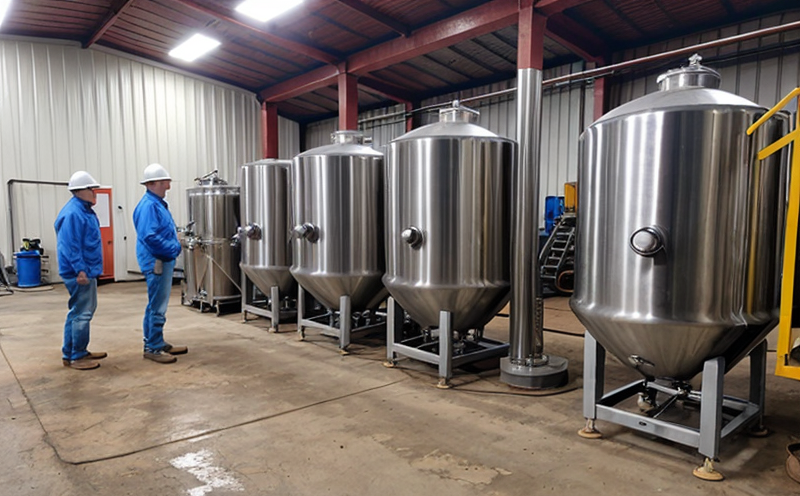Mixing and blending equipment inspection
When it comes to ensuring the quality of products in sectors such as pharmaceuticals, food & beverage, chemical manufacturing, and industrial processing, the integrity and performance of mixing and blending equipment are paramount. These machines play a critical role in achieving consistent product quality by homogenizing ingredients during production processes.
The inspection process for these pieces of equipment involves a detailed assessment to identify any potential issues that could affect the efficiency or accuracy of the mixing/blending operation. This includes checking the motor, blades, seals, and other components for signs of wear, damage, or misalignment. Proper functioning ensures not only compliance with industry standards but also enhances operational safety and reduces downtime.
Our inspection services are designed to meet international standards such as ISO 9001:2015 and ASME U stamp requirements, ensuring that every aspect of the equipment is thoroughly examined. We use advanced diagnostic tools like ultrasonic testing and magnetic particle inspections to detect even minute flaws that might otherwise go unnoticed.
The first step in our inspection process involves a comprehensive review of the equipment’s history and any previous maintenance records. This helps us identify patterns or recurring issues that could indicate larger problems. Following this, we conduct visual examinations followed by disassembly when necessary to inspect internal components closely. Non-destructive testing (NDT) methods are employed for areas inaccessible during initial inspection.
Once the inspection is complete, detailed reports are generated outlining all findings along with recommendations for repairs or replacements if required. These reports serve as valuable tools for decision-making processes within your organization regarding equipment upgrades and preventative maintenance strategies. By adhering to strict quality control measures throughout our service offerings, we ensure that you receive reliable results every time.
For industries where precision is crucial—such as pharmaceuticals or cosmetics—we also offer specialized services tailored towards ensuring that the mixing process complies with stringent regulatory requirements like FDA guidelines or EU directives. Our team stays updated on all relevant regulations so that our inspections reflect current industry best practices and expectations.
Why It Matters
The importance of thorough inspection cannot be overstated when dealing with complex machinery like mixing and blending equipment. Poorly maintained or malfunctioning systems can lead to inconsistencies in product quality, increased operational costs due to frequent breakdowns, and even safety hazards if not addressed promptly.
Ensuring that these machines operate correctly is essential for maintaining consistent batch-to-batch consistency which translates directly into customer satisfaction. In industries where brand reputation relies heavily on product uniformity, such as food & beverage or pharmaceuticals, any deviation could result in significant financial losses and damage to public trust.
From an operational perspective, regular inspections help extend the lifespan of your equipment by catching issues early before they escalate into more serious problems. This proactive approach not only saves money on replacement costs but also minimizes disruptions caused by unexpected failures during production runs.
In terms of regulatory compliance, many sectors have strict regulations governing how certain processes must be carried out. By conducting regular inspections and ensuring that your equipment meets these standards, you can avoid costly fines or other penalties associated with non-compliance.
Benefits
The benefits of thorough mixing and blending equipment inspection extend far beyond mere compliance; they offer tangible advantages that positively impact various aspects of your business operations. One significant benefit is improved product quality which translates into higher customer satisfaction levels.
Another key advantage lies in reduced operational costs through prevention of costly repairs and replacements caused by neglected maintenance. Regular inspections allow for timely interventions before minor issues turn into major problems, thereby saving money on downtime and labor expenses.
In addition to these financial savings, there are also environmental benefits associated with proper equipment management. By extending the useful life of your machines through regular servicing, you contribute towards reducing waste generation linked to premature disposal or replacement of faulty units.
Customer Impact and Satisfaction
The impact of effective mixing and blending equipment inspection reaches far beyond internal processes; it significantly influences customer satisfaction as well. Consistent product quality is one of the primary drivers behind customer loyalty, which in turn leads to repeat purchases and positive word-of-mouth recommendations.
By ensuring that your products consistently meet or exceed expectations set by both regulatory bodies and end-users, you build a strong reputation for reliability and trustworthiness. This can be particularly beneficial in competitive markets where brand recognition plays a crucial role in attracting new customers.
In sectors like pharmaceuticals or cosmetics, meeting strict regulatory requirements is not just about avoiding legal issues; it’s also about protecting public health and safety. Ensuring that your mixing equipment operates correctly according to these guidelines helps maintain consumer confidence and trust.





